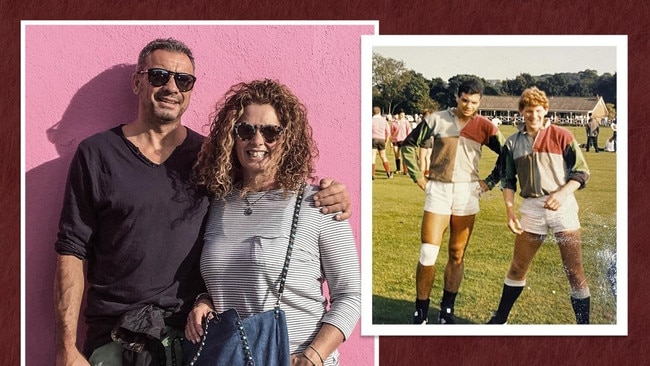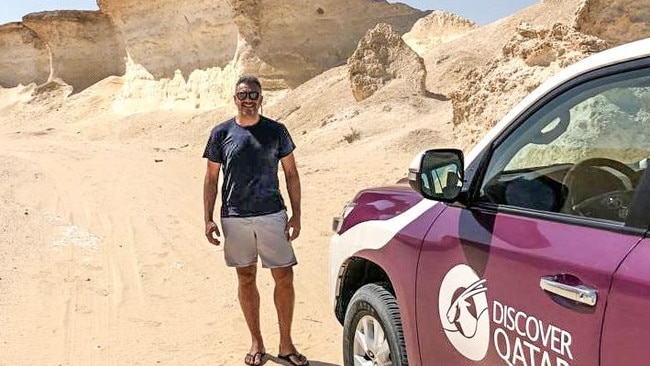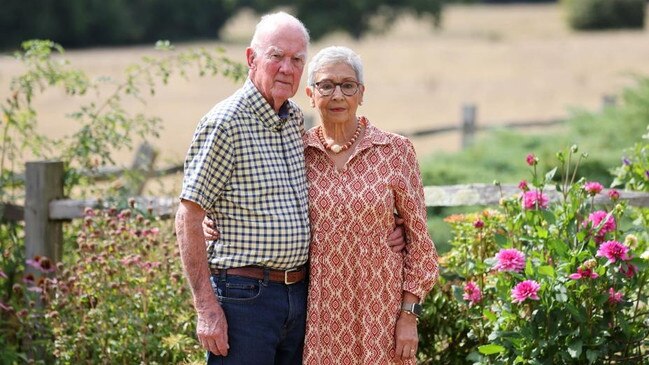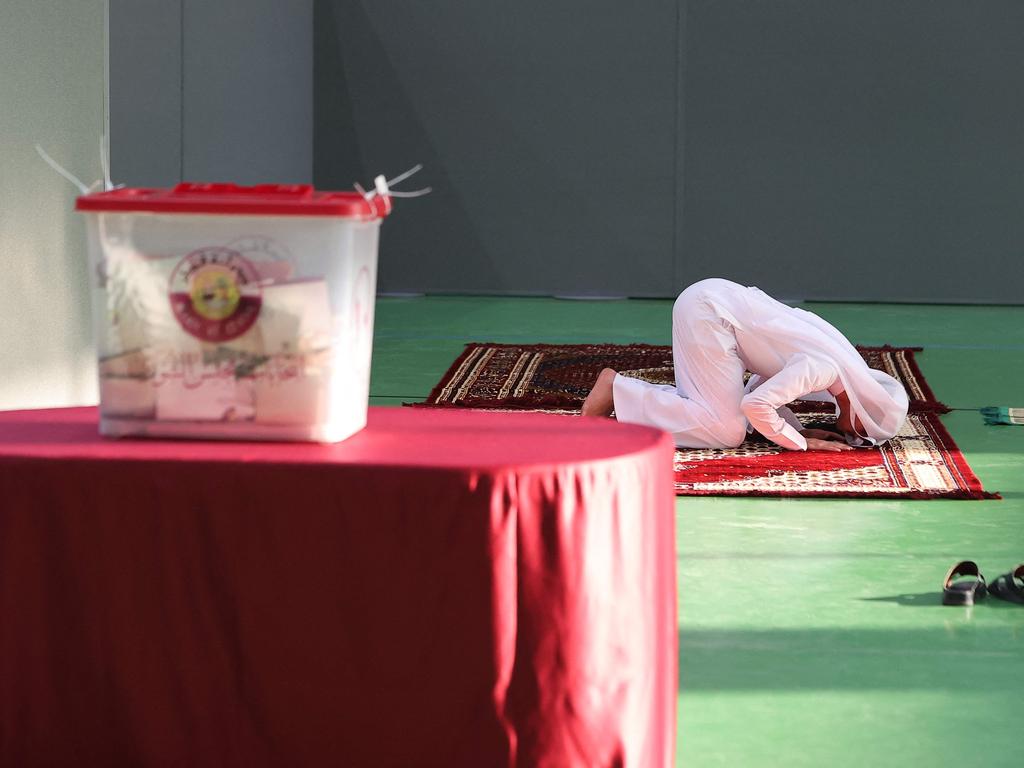Ex-rugby player Marc Bennett was joking with family on eve of Qatar ‘suicide’
A travel industry executive, headhunted to boost Qatar tourism for the World Cup, died in mystery circumstances after telling friends he’d been detained and tortured by its secret police.

In the early evening of December 23, 2019, Marc Bennett called home from Doha to catch up with family life. “The children were here sitting round the table, I was cooking, it was a long conversation – all of us laughing and joking,” Nancy Bennett recalls.
“The boys stood back to back to show how they’d grown. Marc was going to a party on Christmas Eve, he’d had his hair cut and ironed his party clothes – it was like a family sitting around the dinner table except Marc was on FaceTime.”
The next day, Christmas Eve, calls to Bennett’s mobile and hotel room went unanswered. That night hotel staff entered his apartment and found him dead. Police called on the Bennett family in Sussex on Christmas night to break the news. At the same time their counterparts in Doha were hurriedly declaring his death a suicide by hanging.
Bennett, 52, was a prolific communicator, a man who texted and called his big circle of friends and family throughout the day. Yet there were no final emails or texts and no note – or at least none that has been disclosed. The Sussex coroner ruled last year that “whilst Marc Bennett died of hanging, there is no specific evidence of suicidal intent”.
What there is, however, is a long list of unanswered questions about the death of a man known for his love of friends and family, his sporting passions (he played rugby for Harlequins Under-21s in the 1980s as captain, for Haywards Heath and the Sussex county senior side) and his high-flying career in the travel industry.
The Times has pieced together a disturbing picture of his ordeal in the last ten weeks of his life, trapped by an autocratic regime in a country he had helped to promote as a holiday paradise. Our investigation details how Bennett was arrested after resigning from his senior post with Qatar Airways, held in a secret detention centre where he said he was tortured physically and mentally before being released into legal limbo and banned from leaving the country.
His treatment raises difficult questions for Qatar Airways, for the Qatari authorities and for the Foreign Office (FO) about what it did to help a Briton in distress and to assist his family later in finding answers.

Bennett was a leading light in the travel industry. A former director at Thomas Cook and Tui, he revolutionised international sports tourism and helped to transform Dubai into a go-to destination, contemporaries say. In 2017 he was poached to become senior vice-president at Discover Qatar with the job of developing tourism for the 2022 World Cup. Bennett worked hard to modernise the country’s image and facilities. He told an interviewer in 2018 that Qatar was “an incredibly safe place to come to”.
The demands of the job, however, kept him away from his wife and three children and a weekend visit home required a 14-hour round trip. He began looking for a new job and in 2019 was approached by a Saudi company, which offered the chance to spend more time working from the UK. That September he handed in his notice.
Bennett told his family that he had permission to conduct a handover briefing for his successor at the UK World Travel Fair in London the next month. On October 11 he flew home and told his family he did not expect to have to return to Doha. Behind the scenes, however, former colleagues claim there was fury at Qatar Airways that Bennett had resigned to work for a Saudi rival. At the time Saudi Arabia was the main actor in a diplomatic blockade that left Qatar isolated from its Gulf neighbours.
In 2017 Saudi Arabia, Egypt, the United Arab Emirates and Bahrain cut diplomatic relations with Qatar, accusing the country of being close to Iran and supporting terrorism. The dispute was resolved last year.
A former senior executive, speaking anonymously, claimed: “Marc was the blue-eyed boy, he went to meetings about the World Cup with the [Qatar Airways] chief executive Akbar al-Baker and the emir. When he left senior people went ballistic. His resignation was seen as a massive insult.”
Baker is one of Qatar’s most powerful men and is said by former staff to be a domineering boss. He has the title His Excellency and described himself in 2013 as “the soldier of my government”. He sits on the board of Heathrow Airport Holdings Ltd.
The day after he arrived home Bennett was asked to return to Doha to finalise some paperwork. His family say the call was unexpected but he agreed for the sake of future relations. He flew back to Qatar on October 13 and had booked a return flight for October 15, his last day of employment with Qatar Airways. That morning Bennett called his wife saying there were problems. Two more flights were cancelled then on October 17 Bennett was asked to come to Qatar Airways’ head office.
The airline disputes the family’s account of these events. It says Bennett was a “valued colleague” who resigned with the company’s best wishes but had been expected to return to Qatar “to finalise his departure from the business”.
A spokesman for Qatar Airways said: “On 15 October Marc left the business and evidence subsequently came to light showing that over a significant period of time Marc had emailed highly confidential documents relating to Qatar Airways to a private email address without authorisation. Marc was still in Qatar at the point this discovery was made. He was arrested and this then became a police matter.”
His former colleague said the airline’s then head of internal audit, Aneta Wojtun, led an investigation, accessing all Bennett’s emails and phone communications. He added: “She pulled the trigger.”
Bennett later told friends that state security police were waiting at the office. He was questioned then taken out of a rear exit. Before being put in a car he was handcuffed and blindfolded. The next morning Nancy Bennett had a call from her husband. “We both knew without saying that the call would have been taped, so we were very guarded,” she said.
She alerted the FO and the case was passed to the embassy in Doha, which was later told that Bennett was in possession of “commercially sensitive data”. His family think this must refer to material on his laptop for the handover briefing they say he had lined up in London.
It is understood that Qatar Airways dispute any handover briefing was planned for London. The Times has spoken with a senior travel industry figure who had an appointment with Bennett at the travel fair.
When Bennett next called his wife on November 2 his voice was “shaky, hoarse and unrecognisable”. He was not allowed to discuss his case. Then on November 10, when he thought he was to appear in court, he was abruptly released – dropped off at a hotel with no documents other than a Post-it note with a telephone number.
Bennett borrowed a phone to tell his wife he was free but was reluctant to disclose what had happened. Over the following weeks, as he waited, hoping to be either deported or given permission to leave, he confided in trusted friends. One man said: “He seemed like a little lost and scared boy. He was very shivery. His voice was very soft, unlike the confident Marc I knew – he seemed traumatised, paranoid. He was an awesome guy but they put him through a lot of crap and left him with a lot of fear.”

Bennett recounted face-to-face what he had been afraid to say on the phone: after his arrest he was taken to a bare cell, was stripped and had a high pressure hose turned on him; the powerful water jet was directed at his genitals, causing bleeding.
The air conditioning was turned up causing him to shiver naked as guards screamed abuse. He was slammed against the wall, cutting open the back of the head, and subjected to sleep deprivation techniques including the constant blare of loud music. His guards pressed him to describe how he might “commit suicide”. At night, if he drifted off he was roused and taken for interrogation. The questions were always about his “Saudi contact”. Several times he was told to pack for release then thrown back into his cell.
He recalled being “paraded” into a courtroom where he found himself accused of “endangering the Qatari economy” and thought he heard the word “espionage”.
His eventual release was confusing. Neither lawyers nor embassy officials could find details of the case or any charges against him. But his passport had been confiscated and he could not leave the country.
Bennett did not reveal full details to embassy officials of his alleged mistreatment. He told his wife he did not want to “poke the bear”.
Mrs Bennett said: “He was anxious, frightened, he didn’t know what was happening. He was hoping he would be deported, he was looking at flights every single day – not necessarily to the UK but anywhere. He would go for daily walks, he’d borrow a friend’s bike but when he was out he would walk with a hoodie up and if cars did slow down behind him he said his heart would start pounding.”
As Christmas approached there seemed to be hope. The embassy believed, as he had not been formally charged, Bennett would be obliged to leave Qatar. Officials promised to escalate the case after the holidays. Mrs Bennett said that although sad he could not be home for Christmas, Bennett was looking forward to friends visiting in the new year.
She was dumbstruck when police called on Christmas night to say he was dead: “I remember being told but, I’ll be honest, I don’t remember a huge amount more. The police officers left a number and my sister had to take over and try to find out what happened.”
The Qataris offered to repatriate his body within two days. The family, however, insisted on visiting Doha to bring his remains home.
As she arrived at her hotel, Mrs Bennett was approached by Baker. She recalls he offered condolences but was evasive when she asked what had happened, why Marc had been detained, why he had been unable to leave the country. “He kept saying he only had two minutes,” said Mrs Bennett. She would like a further meeting with Baker to try to understand what happened.
She had been accompanied to Doha by a family friend who was an ex-Scotland Yard counter-terrorism officer. The party obtained access to the room where Bennett died.
“That room gave me the immediate impression of someone living there with a plan for tomorrow,” said the ex-detective, who still works in international security. “In scenes of suicide there are often signs this is the last day – they write a note, some kind of explanation. They wash up, they tidy up. None of that was in evidence here. There was a drying rack with his sports kit and a towel. His pillows were laid out on the bed in the way Nancy said he always arranged them when reading, and there was a paperback, pages down, spine up. His clothes for a night out were ironed, his shoes were polished. These were indicators this was a guy who intended to live. It was as if he’d just got off the bed to answer the phone or a knock on the door. My gut was screaming at me ‘you can’t treat this as a suicide’.”
In February 2020, two months after his death, Bennett’s friends in the UK heard their phones pinging with alerts saying he had left their WhatsApp groups. Someone in Qatar was deleting the contents of his personal phone. That phone has never been returned to the family and other phones and a laptop that have been returned were wiped clean or had hard drives removed.
Mrs Bennett said: “There’s no digital trail. I don’t know who he spoke to, what he googled.”
In the weeks after Bennett’s death, FO officials promised to escalate the case to ministerial level. Family members wrote to Dominic Raab, then foreign secretary. Diplomatic notes were sent to the Qatari authorities but no minister contacted the Bennetts. On September 22 last year, a week after Liz Truss became foreign secretary, officials told the Bennetts they were closing the case.
Micki Bennett, 81, the dead man’s mother, said: “We felt our questions went to the very bottom of the filing tray – we got replies but they were very bland, basically saying ‘we’ve done what we can’.”
The FO responded to detailed questions from The Times with a one-line statement: “We provided assistance to the family of a British man, following his death in Doha.”
The Qatari government did not respond to requests for comment. But in an official note to the FO it said the “state security service carried out their procedures taking into account international resolutions, norms and treaties”. It added that Bennett had been “released in good health” and the security service was “not responsible for [his] suicide as it was an individual act”.
Qatar Airways said: “Marc Bennett was a valued and popular former colleague of Qatar Airways Group who made a significant contribution to our business and, while we were sad to see him leave the business, he left with our best wishes. Marc’s former colleagues at Qatar Airways were shocked to hear of his tragic death and we provided assistance to his family by way of a contribution towards repatriation costs and certain travel and other costs.”
Micki Bennett remains “haunted” by the thought of what her son suffered: “Marc served Qatar well, he worked incredibly hard, he loved his job and he was very good at it. Where is the evidence to show that he did something appallingly wrong or why he was detained in the way he was, why was he treated as appallingly as he was? Marc lived and breathed for his family. I can never believe he took his own life, he was just not that person”.
The Times







To join the conversation, please log in. Don't have an account? Register
Join the conversation, you are commenting as Logout